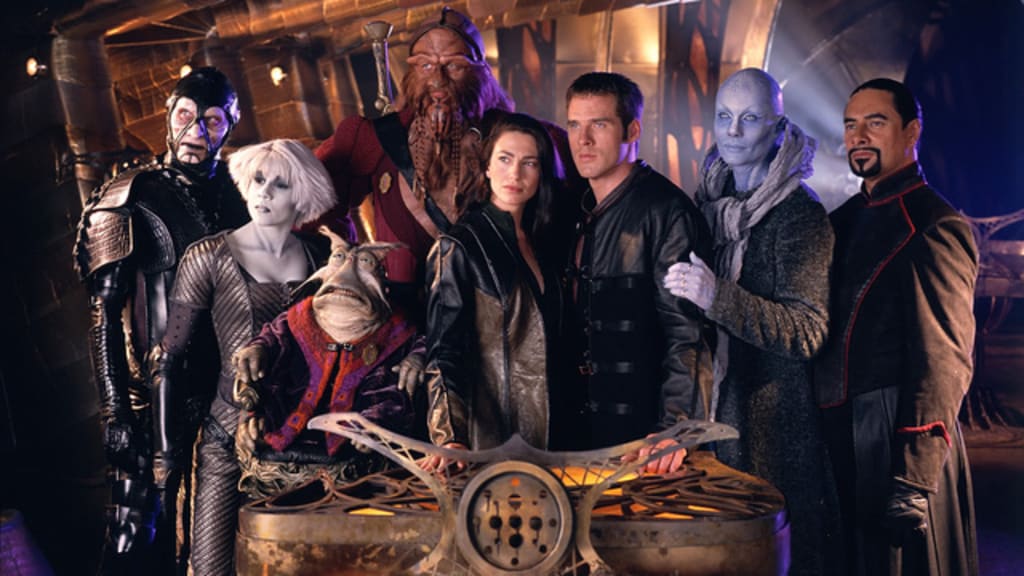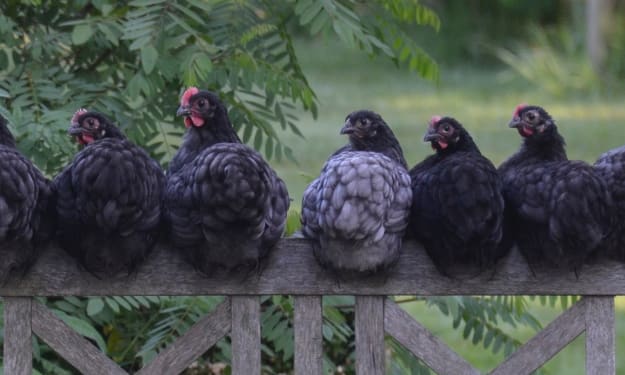
In the last few decades, we’ve seen some pretty amazing science fiction franchises—The X-Files, Stargate, Battlestar Galactica, Alien, the reemergence of Doctor Who, and let’s obviously not forget Star Wars and the multiple iterations of Star Trek.
These days there are so many science fiction titles out there that some of the really good ones can sadly get lost in the shuffle. For instance, we all know about Firefly—Joss Whedon’s space cowboy saga which saw its life cut incredibly short, though it went on to become a cult classic with a film and a canonical comic series.
But do you know about Farscape?
In case you didn’t know, Farscape is incredibly weird and wonderful in a sort of “Buffy the Vampire meets Doctor Who and has a love child that sort of looks like Lexx but sometimes feels like Cthulu and The Fifth Element” way... It’s kind of all over the place, but in a good way.
To give you some background, Farscape’s creator Rockne S. O’Bannon is the same guy that gave the world Alien Nation, SeaQuest DSV, and even wrote some episodes of The Twilight Zone in the 80s. Since Farscape, O’Bannon has written and produced a variety of things—mostly science fiction—that have ranged from whimsical to horror-ish. This should give you an inkling of what to expect from Farscape.
Before the Sci-Fi Channel went on to become SyFy (a move that would have nerdfans collectively sighing an exasperated WTF), they approached O’Bannon about creating something new and original. He gave them that, and a whole lot more. The series ran for only 4 seasons, despite the fact that it had been planned for 5. Thankfully, public outcry warranted a 3-hour mini-series and a comic book series to continue the story.
All that aside, what the hell is Farscape even about?
At first, the premise seems to hearken back to the classic science fiction story: A handsome, athletic scientist/astronaut from Earth finds himself unexpectedly flung into an unknown part of the galaxy and is forced to survive with multiple hither-to unknown species of sentient beings.
That’s mostly where the initial cliché ends. Not entirely, but mostly. Much of the series has a tendency to spin cliché on its head, and I’ll explain how in a bit.
John Crichton is an astronaut and scientist who gets to field test his own theory regarding using the planet’s own gravity to propel his special craft named Farscape-1. Or something like that. Okay, so it’s not hard science fiction, but it stays interesting.
My initial reaction was that John comes off as sort of this slightly douchey and typically entitled white American male. And maybe at first he kind of is. Things change. During his experiment in space, he gets flung through a wormhole and right into the middle of a space battle. Upon entry, Crichton accidentally causes the death of a Peacekeeper pilot. What he soon learns is that Peacekeepers are “the bad guys” so to speak. Crichton finds himself aboard a living prison ship called Moya that’s been commandeered by former prisoners—as it currently does battle with the Peacekeepers.
Now there are some common tropes, but would it be any fun without them?
Trope #1 is that while the prisoners are all varied alien species, they are all relatively humanoid—save for the pilot known as Pilot—super original I know, but it’s cool—(he's a squid-like creature who is bio-mechanically hardwired into the ship itself) and the exiled Hynerian Dominar Rygel XVI (a muppety-looking creature that honestly looks a bit like Donald Trump and acts only a slight bit more civilized).
Trope #2 is that the Peacekeepers, or Sabaceans, are identical to humans (with slight differences that emerge now and then), but they explain why later. It makes more sense as the series goes on. Also, the Peacekeepers are basically an empire controlling much of the galaxy, complete with massive warships, space stations, and one-person fighter crafts reminiscent of pretty much everything from Star Wars to Cowboy Bebop.
Trope #3 is the use of universal translators. Being an author of science fiction myself, this device is hard to get past. Characters have to communicate somehow, and it’s a lot less confusing if they’re all speaking the same language. Or at the very least, the audience should perceive it as the same language. With this comes alien names that sound awfully like something you could derive from European languages. But an added bonus is that swear words don't translate into English, so we get fun cusses like "frell," "hezmana," and "drenn." Yay for alien profanity!
Ah, but such is sci-fi. You can only take the humanity out of it so much. Anyhow… Crichton finds himself aboard Moya with Pilot, Rygel, Luxan warrior Ka D’Argo, and the Delvian priestess Pa’u Zotoh Zhaan (aka Zhaan). At first, Crichton is imprisoned with a captured Peacekeeper pilot known as Aeryn Sun—and seeing as how she’s a dead ringer for a human, and a good looking one, of course, you can see that John’s intrigued. Aeryn, being the badass soldier that she is, beats the crap out of Crichton at their first meeting.
There’s one last introduction: Bialar Crais. He’s a Peacekeeper captain whose brother was accidentally killed by Crichton in the very first episode, and now he wants revenge. He also attempts to track down and manipulate Aeryn Sun throughout the series. Things soon get vastly more complicated as Crichton discovers a world far beyond fully understanding and a political realm that’s way more interesting than Star Wars’ boring trade deal talks (à la Phantom Menace).
What makes it amazing?
This series deals with a variety of issues from the politics of genocide to xenophobia, from the 9/11 attacks to finding equality in romantic relationships. As John’s world expands, so does his mind in ways that both mold him into a better person and also begin to drive him mad. There are points in the series where he is hardly sane, and there are times when that’s the only thing helping him survive.
The interesting thing about this show is that the female characters are strong and independent and never to be messed with. Aeryn, as a Peacekeeper commando, is a trained pilot and assassin, and though emotionally walled-off, she is complicated and real. Likewise, all the other female protagonists and antagonists demonstrate their own unique strength and intelligence. To me, this is a breath of fresh air compared to the many sci-fi stories involving women that are mostly there to be "eye-candy."
Though Jim Henson’s son Brian produced and contributed to the series, this is definitely not a kid’s show. Various episodes deal with inter-species sexual relationships—especially as D’Argo is a virile Luxan male who has a thing for Sebaceans as well as other species. These people are all rebels, though not your squeaky clean Star Wars rebels—not by any means. They’re on the run, they’re amoral, and they’re desperate. John has a conscience and strives to do the right thing, but survival often makes things complicated. In the end, he becomes a vigilante of sorts, and half the galaxy comes to think of him as a legend.
Ultimately though, the characters are very well drawn and have interesting backstories. There is enough comedy and camp to keep it weirdly entertaining, but as I’ve said, they also deal with some pretty deep and dark subject matter. There’s plenty of action and grit to go around. Furthermore, there are entire episodes that take place solely in the mind of our not-so-cliché-as-we-thought hero. It gets trippy with a bit of psychology thrown in.
The antagonists are also interesting and strangely real. They are complex and sometimes even vulnerable. Sometimes, they are even allies when the situation turns dire.
In all honesty, I just really love the costume design and sets.
What could have been done better?
There is a serious lack of ethnic diversity in the cast, even for a show that spanned from the late 90s to the early 2000s. When there are some characters played by people of color, they are all cast as secondary characters. Pretty much showbiz as usual. Sigh...
Though the show hints at sexual diversity from time to time, the sexual orientations and gender identities of multiple alien species seem still just as "binary" as those on Earth. I get it, SyFy wanted something weird but not so weird that it would get kicked off TV. They even filmed the series in Australia because, as O’Bannon put it,
“Australians are just incredibly wild individuals, and they embraced the insanity of the show.”
There are also some very “typically male hero” moments—especially early on—wherein Crichton often has to be the “leader”, likes to yell, and gets angry when things are out of control. I do like that he changes over time—even in his romantic relationships, he goes from being more of an alpha male to a co-equal male. Same with his relationship to the crew; It changes from everyone vying for control to a more egalitarian anarchic delegation.
Overall
Farscape, like most good sci-fi and fantasy, is a reflection of our humanity projected into the speculative. This series is often overlooked because of its short running time or its initial weirdness, but for me, it remains one of the best out there. Beyond what could have been a focus on special effects or creature features, it chose instead to deal with relatable themes and personalities, despite how alien it all can seem. It pushed humanity to the edge, but never really lost hope in it.
Sources:
About the Creator
JA Laflin
Born in the US Pacific NorthWest, JA Laflin loves the metro areas as well as the beautiful Oregon scenery. They run a small publishing company and have authored fiction, poetry, graphic novels, and dabbled extensively in music and the arts.






Comments
There are no comments for this story
Be the first to respond and start the conversation.